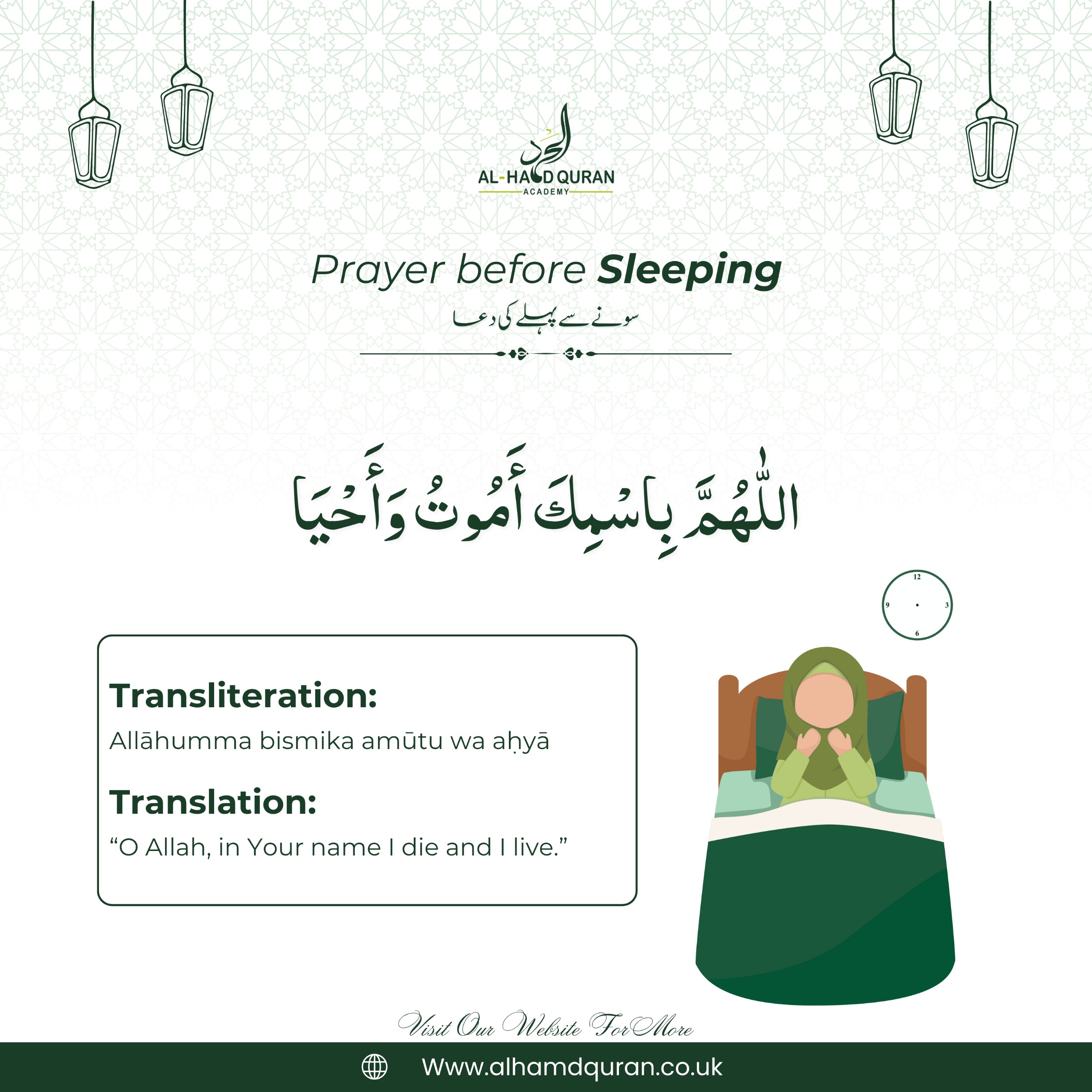
In Islam, bedtime is not merely a physical rest but a spiritual opportunity to connect with Allah. The Prophet Muhammad ﷺ taught us specific supplications (du'as) to recite before sleeping, transforming this daily routine into an act of worship. Among these is a beautiful dua recorded in Sahih al-Bukhari that the Prophet would say when preparing to sleep.
اللَّهُمَّ بِاسْمِكَ أَمُوتُ وَأَحْيَا
Allahumma bismika amutu wa ahya
"O Allah, in Your Name I die and I live (wake up)"
This profound yet concise prayer encapsulates the Islamic worldview - recognizing that both our temporary "death" in sleep and our awakening are by Allah's will. It's a declaration of complete reliance on our Creator, acknowledging that life and death are ultimately in His hands.
This dua holds multiple layers of meaning in Islamic tradition:
The Prophet ﷺ taught that remembering Allah before sleep safeguards the believer throughout the night. In a hadith, he mentioned that neglecting this remembrance allows Shaytan to "tie knots" on one's head, making them sluggish in worship the next day.
The dua powerfully affirms monotheism by declaring that both our temporary "death" in sleep and our awakening are by Allah's command alone, not by our own power or any other force.
The dua echoes Quranic verses like "It is Allah who takes the souls at death and those that do not die during their sleep" (39:42), reinforcing our understanding of sleep as a minor death.
"When any of you goes to bed, let him lie on his right side and say: 'Allahumma bismika amutu wa ahya.' [O Allah, in Your name I die and I live.] If he dies during the night, he will die in a state of fitrah (natural disposition)."
The Prophet Muhammad ﷺ established a comprehensive Sunnah for bedtime that goes beyond just this dua. His nightly routine included:
This holistic approach combines physical comfort with spiritual preparation, making sleep itself an act of worship when done with these intentions.
Modern research confirms what Islamic tradition has long taught - that bedtime rituals have significant benefits:
Reciting the dua before sleep can lower stress hormones, as it shifts focus from daily worries to trust in Allah's protection.
The rhythmic recitation and focused breathing during dua can activate the parasympathetic nervous system, promoting deeper sleep.
Regular bedtime remembrance reinforces Islamic beliefs and makes faith a constant in all aspects of life, even sleep.
Instilling this beautiful Sunnah in children requires patience and creativity. Here are some effective methods:
Remember that the goal isn't perfection but nurturing love for Islamic practices. Even if children initially recite partially or make mistakes, gentle encouragement will help them improve over time.
Here are some effective strategies to help children memorize the bedtime dua:
Most importantly, make the process joyful rather than pressured. Children absorb more when learning is associated with positive emotions.
The bedtime dua holds profound significance in Islam for several reasons:
In our distracted age, this simple practice anchors believers in timeless spiritual truths.
While understanding the meaning is crucial, Islamic scholars emphasize preserving the original Arabic wording for this specific dua because:
That said, one should absolutely learn and reflect on the meaning in their native language. The ideal approach combines Arabic recitation with comprehension in one's mother tongue.
If you realize you forgot the dua after already lying down or upon waking up:
Islam emphasizes ease and understands human forgetfulness. What matters most is consistent effort rather than perfection.
May Allah grant us the ability to implement this beautiful Sunnah and make our sleep a means of drawing closer to Him. Ameen.
Learn More Duas
Where Faith and Knowledge Grow.
Connect With Us